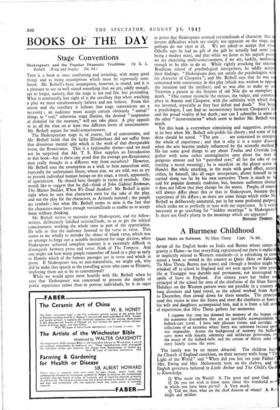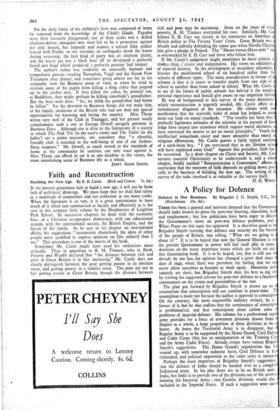A Burmese Childhood
Quiet Skies on Salween. By Ellen Thorp. Cape. 7s. 6d., AFTER all the English books on India and Burma whose centre gravity is Home--so•that everything experienced out there is explici or implicitly related to Western standards—it is refreshing to co across a book so rooted in the country as Quiet Skies on Salwe• To Miss Thorp, Burma was home; and (though a brother might whisked off to school in England and not seen again for nine years life at Taunggyi was durable and permanent, not interrupted b spells of leave in England. For sixteen years her father w• principal of the school for sons of the chieftains of the Shan State Holidays on the Western pattern were not possible in a country long distances and hard travel, so the school worked from Ap to December, then closed down for three months. The princip used this recess to tour the States and meet the chieftains at home his wife and daughters accompanied him, and it is from a full star of experiences that Miss Thorp gathers her memories.
I suppose that time has dimmed the memory of the bumps an the numerous discomforts that are an inevitable accompaniment t bullock-cart travel. I have only pleasant visions and nostalgic r collections of an existence where hurry was unknown because spe was impossible. Across the background of memory the bullock carts move with hieratic solemnity and deliberate procession, an the music of the bullock-bells and the scream of thirsty axles s carry faintly across the years.
The family was by no means deracine. The children lear the Church of England catechism, on their nursery walls hung " Light of the World " and " When did you last see your Father? Mrs. Ewing and Mrs. Molesworth were on the shelves, and English governess believed in Little Arthur and The Child's Gu, to Knowledge.
Q. Who made the World? A. The great and good God. Q. Do you not wish to know more about this wonderful wort in which you have been pla"ed? A. Very much. Q. Tell me then, what are the chief diseases of wheat? A. blight and mildew. Yet the daily fabric of the children's lives was composed of items far removed from the knowledge of the Child's Guide. Pagodas were their favourite playground; one of their ayahs was a skilled elephant-driver; mosquito nets were felt to be a protection against not only insects, but leopards and snakes; a retired Sikh soldier fenced with Daddy on the veranda; an earthquake shook the house during evensong; the best kind of party was an elephant picnic, and the nicest pet was a black bear till he developed a perfectly literal sore head which produced a perfectly genuine bad temper.
The author's father was evidently an unusually humane and sympathetic person—reading Xenophon, Virgil and the Greek New Testament after dinner, and sometimes going almost too far in his sympathy with the Burmese point of view, as when he tried to restrain some of his pupils from killing a king cobra that popped up in the cricket nets. If they killed the cobra, he pointed out, as Buddhists, they might perhaps be killing somebody's grandfather. But the boys were firm: " Sir, we think the grandfather had better be killed." Yet his devotion to Burmese things did not make him, or his family, intolerant of the British who had not then any special opportunities for knowing and loving the country. Miss Thorp writes very well of the Club in Taunggyi, and her picture neatly complements such a one as George Orwell savagely presents in Burmese Days. Although she is alive to the limitations of a society in which The Pink 'Un (in the men's room) and The Tatler (in the ladies') are a prime necessity, she considers that " a cheerful, friendly club is essential to the well-being of one of our farther- flung outposts." Mr. Orwell, as much rooted in the standards of home as the community he satirises, can only react against it. Miss Thorp can afford to see it as one incident in the vaster, the more entertaining scene of Burmese life as a whole.
JANET ADAM SMITH.



























 Previous page
Previous page